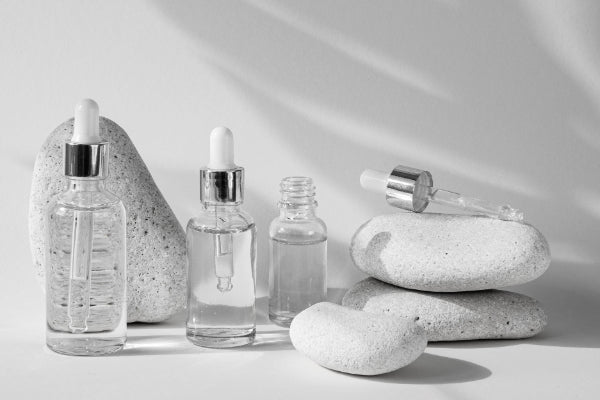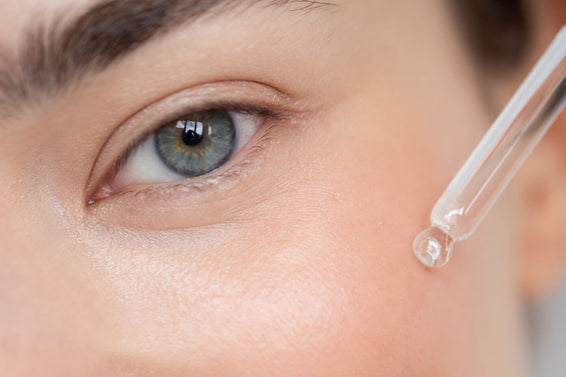Vitamin C is an essential vitamin needed for the body to develop and function properly. It strengthens our immunity to protect ourselves against cold and other infections. It is widely-used for its preventive and maintenance benefits, including keeping the skin healthy.
You’ve probably heard nutrition experts talk about how important it is that you should be getting enough Vitamin C in your diet. Good sources include fresh fruits and vegetables, especially citrus fruits. But eating fresh oranges and freshly-squeezed lemon juice won’t deliver the vitamin C straight to your skin.
Using Vitamin C Serums and other topical products is the most direct way to reap its skincare benefits. The skin-obsessed uses this powerful serum to get smooth, glowing complexion.
Here, let’s get you into the details about Vitamin C serum, including its benefits, how to apply it, and what precautions you need to consider.

What is a Vitamin C Serum, and What’s in It?
A Vitamin C Serum is a skincare product packed with vitamin C. It has the texture or consistency of a thick liquid or gel, applied topically to the skin. Different types of vitamin C serums are widely available in beauty stores, skincare shops and even drugstores. Various brands would refer it as “brightening”, “firming”, or “anti-aging” serum.
The most effective types of vitamin C serums also contain other antioxidants like Vitamin E and nourishing extracts like Green Tea Extract and Aloe Vera Extract for added anti-aging benefits. For a more advanced formula, you may see Salicylic Acid for deep cleansing and Glycerin for moisturizing effects.

Benefits of Vitamin C Serum for Skin
Vitamin C is touted as one of the best anti-aging ingredients on the market. It is considered to be a key in maintaining a flawless, even-toned, and glowing complexion as it provides a number of benefits for the skin.
Brightens and Balances Skin Tone
Vitamin C acts as an anti-inflammatory agent, which soothes your skin and reduces redness. It evens out the skin tone as it helps brighten up your complexion. It is also found to improve dark circles of the under eyes. The combined reduction of dark spots, irritation, and discoloration results to a clear, glowing skin tone that get you noticed.
Fades Hyperpigmentation
Since it inhibits melanin production, Vitamin C can actually fade hyperpigmentation. Hyperpigmentation occurs when melanin is overproduced in certain areas of the skin commonly caused by sun exposure and skin inflammation. It is also referred to as sun spots or age spots because it usually appears as a person gets older. Vitamin C regulates this process as well as lightens existing dark spots on the skin to give it a more youthful appearance.

Supports Collagen Production
Collagen is naturally present on our skin but it depletes as we get older. Lower levels of collagen in the skin results to fine lines and wrinkles. It can further progress, leading to sagging old skin.
Vitamin C cannot reverse the appearance of wrinkles that developed naturally over time. But it can help slow down the aging process. It prevents premature wrinkling by stimulating the growth of collagen. That’s why it’s better to use it earlier before these signs of aging start to appear.
With Vitamin C incorporated in your routine, the natural synthesis of collagen as well as elastin is boosted. Collagen and elastin are two of the basic structural supports of our skin found in the dermis (middle layer of the skin). It acts as the skin’s cushion which gives it strength, firmness, and elasticity.
No to sagging skin, hello to youthful plumpness!
Promotes Wound Healing
Vitamin C is believed to accelerate cell turnover, the natural process of replacing damaged cells with healthy new ones. Application of Vitamin C helps speed up wound healing. Healthy wound healing reduces the possibility of inflammation, infection and scarring. This is the reason why Vitamin C is effective for soothing sunburns. So, after getting spending a day at the beach, it won’t hurt to smear some drops of Vitamin C Serum on your skin.
Protects Against Sun Damage
Sun damage is triggered by molecules called free radicals and excessive sun exposure. Vitamin C is an antioxidant that helps fight off these free radicals. Antioxidants protect healthy skin cells to keep it from getting damaged.
With the added power to regenerate new cells and reduce the appearance of skin blemishes, Vitamin C makes the skin look more flawless and healthier with constant use.

How Vitamin C Serums Work
Topical application of Vitamin C can be a bit of a challenge since it can break down in the presence of factors such as air, heat, and light. Skincare manufacturers like us, Shiny Leaf, prefer to package Vitamin C into serums because it allows higher vitamin C concentrations that the skin can absorb quickly.
Apply the serum after cleansing the skin and before putting on other products like moisturizers. This allows the skin better absorption.
Vitamin C Serums are often combined with other known antioxidants like Vitamin E for added benefits. This enhances its effectiveness in reducing the signs of aging.
What are the Different Types of Vitamin C?
The 7 main types of vitamin C are Ascorbic Acid, Sodium Ascorbyl Phosphate, Magnesium Ascorbyl Phosphate, Sodium Ascorbate, Calcium Ascorbate, Ascorbyl Palmitate, and Tetrahexyldecyl Ascorbate. The main differences are as follows:
- Sodium Ascorbyl Phosphate – more stable and less irritating so it’s suitable even for sensitive skin
- Ascorbic Acid – very unstable and sensitive to light
- Magnesium Ascorbyl Phosphate – very stable, hydrating, and effective in soothing skin irritation
- Sodium Ascorbate – a mineral salt of ascorbic acid, but less irritating and more stable
- Calcium Ascorbate – also a mineral salt of ascorbic acid, important in collagen synthesis
- Ascorbyl Palmitate – fat-soluble derivative if vitamin C, non-irritating and more stable
- Tetrahexyldecyl Ascorbate – stable oil-soluble form of vitamin C that penetrates the skin deeper than ascorbic acid.
Sodium Ascorbyl Phosphate vs. Ascorbic Acid
Generally, vitamin C derivatives are sensitive to light, that’s why you need to give it time to absorb in your skin before going into the light. If you often go out under the sun, avoid using Vitamin C Serum that contain Ascorbic Acid because it’s very unstable and exposure to light will make it useless.
Choose vitamin C derivatives like Sodium Ascorbyl Phosphate found in the Shiny Leaf Vitamin C Serum because it is less sensitive to light compared to other types of vitamin C. It absorbs to the skin better and therefore gives you better results.

Potential Side Effects and Precautions
Vitamin C is generally safe for any skin type. The only exception is those with highly sensitive skin. Since Vitamin C is an active ingredient, people with sensitive skin should consult with a dermatologist before use since some types of vitamin C can sometimes irritate the skin. Common noticeable side effects are:
- Itching
- Redness
- Skin irritation
- Tingling sensation
You should always do a patch test before full application. This is the best way to determine how your skin will react to the serum.
Vitamin C Serum may result in stinging, yellowing of the clothes, or dryness of skin, though these effects are rare. You should also take extra care when applying around the eyes.
Lastly, make sure that you are not using Retinol or any other products that contain Retinol. Combining Vitamin C and Retinol has the potential to irritate the skin. If you are using Retinol, you may use the Vitamin C Serum in the morning and the Retinol at night. This technique takes advantage of the sun-protective benefits if Vitamin C while minimizing the risk of sun sensitivity caused by Retinol.
Dosage
Vitamin C can also be very acidic and cause skin irritation in some people when used in high concentrations. When using Vitamin C serum for the first time, apply a thin layer every other day before moving on to daily applications. This will allow your skin to adjust to the product and prevent skin irritation.
How to Use Vitamin C Serum for Your Skincare Routine
Although Vitamin C Serum is generally safe for all skin types, you should always do a patch test to assess your risk of allergic reaction. Here’s how:
- Take a small amount of product (1 drop is okay).
- Apply it to a small area of your skin that’s easy to conceal like your forearm.
- Cover with an adhesive bandage and wait for hours.
- If no side effects occur, you may proceed with facial application. Discontinue use if you develop signs of sensitivity.

Moving on to full application, always follow the instructions on the product label. Typically, Vitamin C Serum is applied once or twice daily – one in the morning and another at night. Depending on your personal skincare routine, as long as you don’t use it in combination with products that may cause unwanted reactions such as Retinol.
The best skincare routine using Vitamin C Serum would include these steps:
- Cleanse – Wash your face with a gentle facial cleanser.
- Tone – Remove remaining impurities with a regular toner.
- Apply Vitamin C Serum – Take 2-3 drops of the serum and spread gently on your face, neck and upper chest. Use an upward motion.
- Moisturize – Allow the serum to absorb before putting on sun screen, makeup or moisturizer.
















